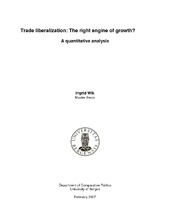Trade liberalization: The right engine of growth? A quantitative analysis
Master thesis
Permanent lenke
https://hdl.handle.net/1956/2766Utgivelsesdato
2007Metadata
Vis full innførselSamlinger
Sammendrag
Do lower barriers to international trade induce a positive effect on economic growth? This has been a highly debated issue within the field of economics for more than a century. Several studies find a positive relationship between openness to international trade and growth. Other studies do not find this relationship to be robust, while some studies find a negative correlation. Classical and neoclassical trade theory is the theoretical framework being the basis for the thesis. The infant industry argument, the structuralist and institutionalist approach, and dependency theory are included as criticism of this school of thought. In addition to openness, other key variables focused on when explaining growth, are indicators related to sector specialization, geography, institutions and political regimes. The research question will be investigated by using multivariate regression analysis and the OLS method. The analysis is based on quantitative data for an aggregate sample of 184 countries over the time period 1950-2004. The results indicate that the classical and neoclassical theories are suitable for the group of OECD countries concerning a positive effect on openness and growth, as well as the presence of convergence in income levels. For the remaining countries, openness does not seem to have a significant effect on growth, and the results indicate rather a divergence in income levels. The answer to the research question based on my results is therefore that lower barriers to trade induce a positive effect on growth only for wealthy countries. An implication of the results is that there still exists unexplained heterogeneity in the data. A positive relationship between openness and growth is therefore contingent of other factors to be present. A remaining challenge is therefore to explore what these contingencies are.
Utgiver
The University of BergenOpphavsrett
The authorCopyright the author. All rights reserved
